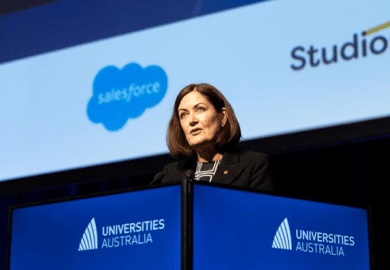Debate has been revived in France about the respective roles of institute researchers and university academics, with the former’s lack of formal teaching obligations under scrutiny as sector leaders warn of a “grim” financial future for higher education and science.
Writing in Le Monde, the economist Dominique Foray said institutions such as the National Centre for Scientific Research (CNRS) should be examined before they “[demand] additional resources”. He contended that CNRS researchers should be given teaching obligations, describing the current system as an “institutional anomaly”. Arguing that academic freedom was “paid for” with teaching, Professor Foray said this exchange “is the fundamental contract of the academic with society”.
“The CNRS researcher behaves like a professor without being subject to the same obligations – having [their] cake and eating it too,” he wrote. Professor Foray pointed to the 2023 CNRS evaluation report by the High Council for the Evaluation of Research and Higher Education (Hcéres), which recommends “encouraging CNRS researchers and engineers to contribute to education”.
But in a joint response also published in Le Monde, 1,100 CNRS researchers said Professor Foray’s article displayed “a profound lack of understanding of the French system and the complementarity it implements by linking training and research”. While researchers do not have a “statutory obligation” to teach, they wrote, they do participate in teaching activities, including supervising internships and doctorates, monitoring committees and organising seminars.
At present, teacher-researchers in universities must fulfil a yearly teaching load of 192 hours. As the Hcéres report notes, however, CNRS researchers also teach in universities and grandes écoles “on a voluntary basis”, with “more than 180,000 hours of teaching…provided each year by approximately 6,000 CNRS researchers”.
In their Le Monde article, the group of researchers criticised Professor Foray for attempting “to pit university teacher-researchers against CNRS researchers, explaining to the former that their difficulties are linked to the alleged privileges of the latter”.
Olivier Coutard, a CNRS researcher and one of the signatories of the response letter, told Times Higher Education that while many CNRS scholars did teach, this “would not solve the difficulties of French universities” because the 11,000-strong workforce would not fill the 24,000 full-time equivalent teaching jobs now fulfilled by non-permanent university staff.
“Imposing teaching obligations on CNRS researchers would certainly reduce the attractiveness of CNRS positions – at least internationally – while probably not significantly improving the working conditions of university academics,” said Dr Coutard, who chairs the CNRS scientific board but was speaking in a personal capacity.
“The real issue is underinvestment in French universities, aggravated by rampant bureaucratisation and constant organisational reform.”
John Ludden, a former CNRS director who is now retired, told THE that there was an ongoing discussion in the French sector “around making the system more flexible, with CNRS researchers doing teaching and the academics being liberated to do more research work when appropriate”.
Potential reform, he said, could see the CNRS “becoming a research project and infrastructure funder, and the CNRS targeting funding to some universities”.
Speaking to THE, Andrée Sursock, a senior adviser at the European University Association (EUA), suggested that giving researchers teaching obligations could benefit their own work as well as university academics and students.
“Classroom teaching is an opportunity to review one’s thinking about one’s research and refine it,” she said. “Students are not just containers to pour knowledge into. One can work with them and have discussions that could change one’s thinking.”
“Right now, the teaching load of academic staff is significant,” Dr Sursock continued. “If more people had the opportunity to teach, then it would be a fairer way of distributing the load.” Employing researchers to teach undergraduates would also provide “an opportunity for students to be exposed to state-of-the-art research”, she added.
Register to continue
Why register?
- Registration is free and only takes a moment
- Once registered, you can read 3 articles a month
- Sign up for our newsletter
Subscribe
Or subscribe for unlimited access to:
- Unlimited access to news, views, insights & reviews
- Digital editions
- Digital access to THE’s university and college rankings analysis
Already registered or a current subscriber? Login








